
22:52, 10-Aug-2018
China-US Trade: US soybeans stranded off Chinese coast for a month
Updated
22:19, 13-Aug-2018
03:15

A US cargo-ship carrying millions of dollars worth of soybeans has been drifting in the Pacific Ocean for over a month. It was due to unload 70-thousand tons of soybeans in the north-eastern Chinese city of Dalian before Beijing's tariffs took effect. Experts are saying the lingering uncertainty over the cargo's fate offers a timely reminder of the real-world effects of the trade war. XING RUINAN has more.
On July the 6th -- more than a month ago -- China went ahead with its first round of tariffs on 34 billion dollars worth of US goods.
On the same day, Peak Pegasus was racing against the clock to deliver 20 million dollars worth of American soybeans to China. However, its efforts were in vain, arriving half an hour late. It has been sailing in circles off the Chinese coast ever since.
China is the world's largest consumer of soybeans. Two-thirds of American soybean exports are sent there. However, more expensive soy could see China looking elsewhere for the bulk of its supply from places such as Brazil and Argentina.
If that happens, American farmers would take an even greater hit. Something President Trump didn't envisage, having told them they'd be the biggest winners.
In the meantime, he's trying to placate them in various ways, such as relief funds.
SONNY PERDUE US AGRICULTURE SECRETARY "This is a temporary measure. Really a time to give President Trump and his negotiating team to get these trade disputes resolved."
However, the US Chamber of Commerce believes that could well be a slippery slope and while American farmers won't turn down money, they're not too keen on a welfare handout either.
MARC ARNUSCH US FARMER "I know I speak for a lot of Colorado farmers when I say we'd rather earn our living through the marketplace than just another handout."
Trade tensions between China and the US intensified further on Wednesday as Donald Trump unveiled a second round of tariffs on 16 billion dollars worth of Chinese good, prompting Beijing to respond in kind a few hours later.
The vice president of a US grain trading company isn't confident about the road ahead, with the value of US soybean futures losing 20 percent since April.
WILLIAM C. DELONG VICE PRESIDENT, DELONG "The American farmer wants to grow soybeans and they want to market their soybeans throughout the world. They don't want to depend on government assistance because of low prices. They want to produce crops. And we have to get these issues worked out, hopefully between our two governments. And we can get back to growing soybeans and selling them to the Chinese."
According to the UK-based newspaper, The Guardian, the Pegasus' isn't the only soybean cargo vessel adrift. Another named Star Jennifer has also been waiting for a fortnight.
Caught up in the trade dispute, the ships continue to bob aimlessly while the cargo's owners decide what to do.
Xing Ruinan, CGTN.

SITEMAP
Copyright © 2018 CGTN. Beijing ICP prepared NO.16065310-3
Copyright © 2018 CGTN. Beijing ICP prepared NO.16065310-3